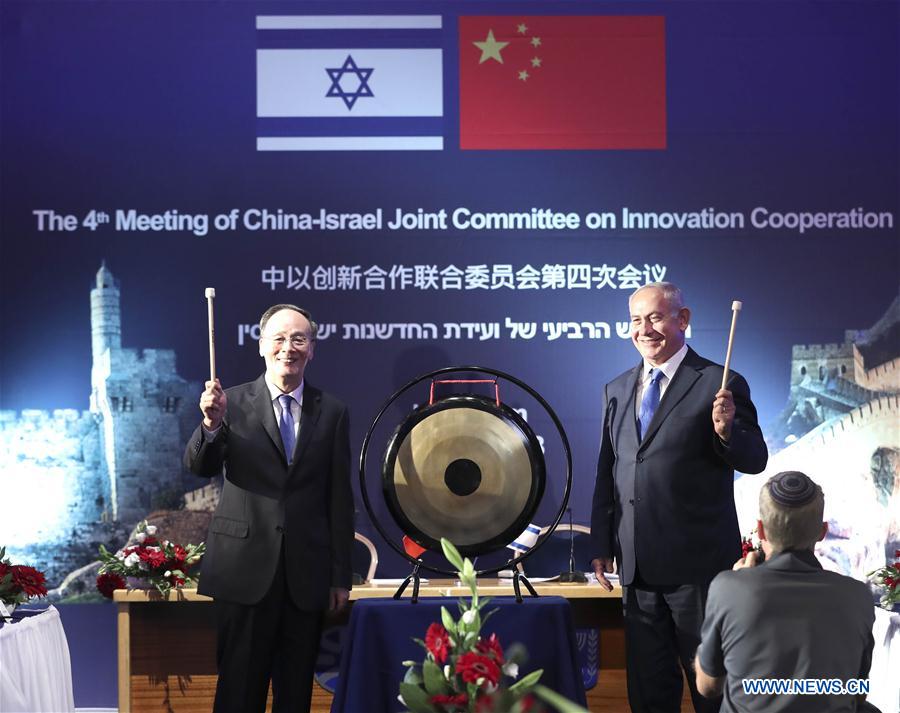China, Israel vow to push for more fruitful innovation cooperation
Chinese Vice President Wang Qishan wrapped up a fruitful visit to Israel on Thursday with a reaffirmed commitment from both sides to further boosting bilateral innovation cooperation for mutual benefits.
Chinese Vice President Wang Qishan wrapped up a fruitful visit to Israel on Thursday with a reaffirmed commitment from both sides to further boosting bilateral innovation cooperation for mutual benefits.
China's Vice President Wang Qishan and Israeli Prime Minister Benjamin Netanyahu co-chair the fourth meeting of China-Israel Joint Committee on Innovation Cooperation during his visit to Israel, Oct. 24, 2018. Wang visited Israel from Oct. 22 to Oct. 25 at the invitation of Israeli Prime Minister Benjamin Netanyahu. [Photo/Xinhua]
During his four-day stay, Wang met with Israeli President Reuven Rivlin and Prime Minister Benjamin Netanyahu, and co-chaired with the latter the fourth meeting of China-Israel Joint Committee on Innovation Cooperation (JCIC).
In his meeting with Netanyahu, Wang recalled that Israel was the first country in the Middle East to recognize the People's Republic of China, and the bilateral ties have enjoyed steady and healthy development since the two countries established diplomatic relations.
The China-Israel innovative comprehensive partnership, set up during Netanyahu's visit to China in 2017, accurately reflects the prominent feature and future direction of bilateral cooperation in the new era, Wang said.
China and Israel, he suggested, should implement the important consensus reached by their leaders, and make good use of the JCIC mechanism, so as to push forward bilateral innovation cooperation to achieve more win-win results.
As a friend of both Israel and Palestine, China hopes for the two sides to coexist peacefully, and stands ready to play a constructive role in achieving peace between the two neighbors and maintaining stability in the region, Wang added.
Netanyahu agreed with Wang's comments and proposals on the bilateral ties, saying that the two nations both boast long history and splendid culture, and they have always admired and respected each other.
Over recent years, two-way trips between the two countries have been increasing, practical cooperation growing steadily, and bilateral relations advancing continuously, said the prime minister.
Israel, he said, is willing to actively participate in the Belt and Road Initiative, and enhance the synergy between its strength in science and technology and China's advantages in market and production capacity, so as to translate their partnership into more benefits for both nations and the world.
Israel welcomes Chinese companies in its infrastructure construction and hopes to further boost trade and investment cooperation with China, added Netanyahu.
He also said that Israel is willing to work with the Palestinian side to achieve peace in the region, and values China's positive role in the Middle East peace process.
When meeting with Rivlin, Wang said Israel's development in the past 70 years has shown that the core of modernization is the modernization of humanity.
China, he said, has listed innovation as the first of its five major development concepts, and is speeding up its transformation into an innovative nation.
Noting that the two countries have a strong will and robust foundation for innovation cooperation, which has been remarkably productive, Wang said China stands ready to join hands with Israel to further deepen their innovative comprehensive partnership.
For his part, Rivlin said the Israeli people will never forget the helping hand the Chinese people extended during World War II, and is greatly impressed by China's tremendous development achievements.
With the two countries having established an innovative comprehensive partnership, Israel is willing to build on the momentum and enhance bilateral exchanges and cooperation in such fields as science and technology, agriculture, education, health care and culture, the Israeli president added.
At the JCIC meeting, Wang said the China-Israel innovation cooperation features similar concepts, complementary advantages, enormous potential and broad prospects, and has over recent years borne rich fruits in such fields as basic science, modern agriculture, health care and energy.
He urged the two sides to take stock of their past cooperation and chart the course for the future, calling for joint efforts to further expand exchanges, create a favorable environment and improve the JCIC mechanism.
Noting that both Israel and China are innovative nations, Netanyahu said the two sides should expand their innovation cooperation into new areas and carry out new projects.
Also at the JCIC meeting, relevant ministries on both sides reported the progress of bilateral cooperation in such fields as science and technology, trade, agriculture, health care and transportation, and laid out their plans and proposals on future collaboration.
The two leaders signed an action plan for bilateral innovation cooperation from 2018 to 2021 and witnessed the signing of seven other documents.
During the visit, Wang also attended the opening ceremony of an Israeli innovation summit in Jerusalem and the inauguration ceremony of an Israeli innovation center in Tel Aviv. He also talked with scientists from Weizmann Institute of Science, an Israeli research university.
The Chinese vice president, who traveled to the West Bank for a visit to Palestine on Tuesday, is on a four-country trip to the Middle East, which also includes Egypt and the United Arab Emirates.


